Mary Anne Yarde's Blog: The Coffee Pot Book Club , page 105
February 5, 2020
February 4, 2020
#BookReview — A Bloody Hot Summer by Trevor D’Silva #HistoricalFiction #MurderMystery @TrevorDAuthor
Published on February 04, 2020 20:00
February 3, 2020
#BookReview — Fortune’s Wheel: The First Meonbridge Chronicle by Carolyn Hughes #HistoricalFiction @writingcalliope
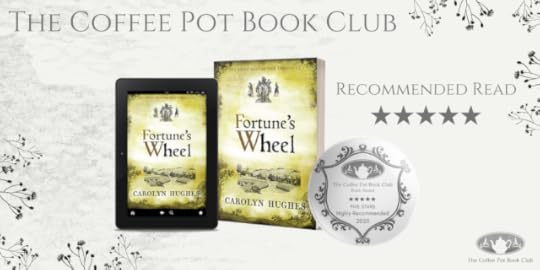
Fortune’s WheelThe First Meonbridge ChronicleBy Carolyn Hughes
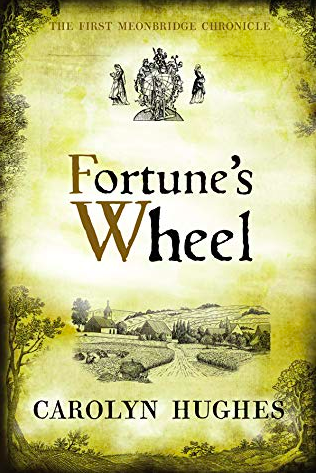
How do you recover when half your neighbours are dead from history’s cruellest plague?
June 1349. In Meonbridge, a Hampshire manor, the Black Death has wiped out half its population, among them Alice atte Wode’s husband and Eleanor Titherige’s entire family. Even the manor’s lord and his wife, Margaret de Bohun, have not escaped the horror.
Now the plague is over, it's a struggle to return to normal life, with so much to do and so few left to do it. Tensions mount between the de Bohuns and their tenants, as the workers realise their scarceness means they can demand higher wages, dictate their own lives.
When the tensions deepen into violence and disorder, and the men – lord and villagers alike – seem unable to find any resolution, the women – Alice, Eleanor and Margaret – must step forward to end the conflict that is tearing Meonbridge apart.

“The world is divided into three estates: the rulers, the prayers and the labourers. In this world each man knows his place and obeys God’s Commandments.”
But that was before God sent down a pestilence upon his people. A pestilence that did not differentiate between the righteous and the sinners. It was before the absolute desecration of the populous.
The Angel of Death had done his worst, and he had moved on. For Alice atte Wode, she would have to learn to live without her beloved husband and son, but there were worse off than her, although at times it did not feel like that. Take Eleanor Titherige, who had lost her entire family bar a step-brother, or the Miller’s who had lost five of their six children.
However, now that the crises were over. The residents of Meonbridge had to find some semblance of normality. After all, there were debts that still needed to be paid, obligations acknowledged, and the crops would be in need of harvesting soon.
Yet, things had changed in Meonbridge. If Sir Richard de Bohun expected his tenants to work three times as hard for the same wage, then he had another think coming.
From the tragedy at the estate’s mill to a spark of rebellion by the tenants, and a gruesome murder just off the road from Winchester, Fortune’s Wheel: The First Meonbridge Chronicle by Carolyn Hughes is a Historical Fiction masterpiece.
Oh, this book had all the feels. I was thoroughly enchanted from start to finish and the time flew by as I lost myself in this incredible work of fiction.
There is a vast cast of colourful characters in this book — from a Baron to the lowliest villein and everything else in between. Initially, I was concerned that I would not be able to keep up with who everyone was and what their place would be in this story. Although Hughes provided a comprehensive character list at the beginning of the book, I am the type of reader who is loathed to use it. I want the characters to be enough to carry the narrative. I don’t want to be confused or bewildered by too many names, and too many storylines. Thankfully, my concerns fell by the wayside very early on in this book, for Hughes has crafted some genuinely endearing and unforgettable characters, whose stories were endlessly fascinating and beautifully told. I did not once look at the character list in the front of the book. Kudos, Ms Hughes. Kudos, indeed.
Hughes has depicted rural life in the 14th Century with a lyrical narrative that is not only bold but wonderfully successful. The Black Death’s legacy was that there was suddenly not enough labourers to farm the land. Through the depiction of Sir Richard de Bohun, Hughes has demonstrated the sheer sense of entitlement that the Barons and Knights felt, and their complete lack of empathy for the villeins in their charge. They expected to pay the same wages to a man who had to work three times as hard as he had before the Black Death, which was not only arrogant but also absurd. Suddenly the villeins found themselves in a position they had never been in before. They could negotiate, regardless of the laws laid down by the King, for a better wage and a better life. This, Hughes demonstrated with all the care and verse of a historian who has done her research and a writer who knows how to paint a dazzling portrait of a hard-up hardworking community. However, Hughes has given her readers a scrumptiously balanced view, showing both sides of the argument, which I thought was incredibly insightful.
The sheer poverty of the villeins was portrayed with a keen sense of time and place. Despite having nothing, the women in this novel still want their homes to be clean and tidy, but on top of this, Hughes described how hard these women worked. They laboured in the fields alongside their husbands and their children. Often, with historical fiction, we witness the lives of the nobility in all its pomp and ceremony, so it was a very welcomed change to read about the less fortunate folk instead. If nothing else, it gave Fortune’s Wheel: The First Meonbridge Chronicle, integrity.
There is not a protagonist, as such, in this book, for there are too many characters and too many interlocking stories for that. However, Alice atte Wode, Eleanor Titherige and Lady Margaret de Bohun certainly drove this story forward. For this is a story of an estate and the people who lived there and worked the land. As I have already stated, this approach worked really well, but there were two very notable characters that I would like to talk about.
Firstly, I must mention Alice atte Wode. Alice is a very frank character, but also a very loving one, who sees what is going on around her with a crystalline understanding. I thought Alice was absolutely fabulous and she was without a doubt, my favourite character in this book.
Lady Margaret de Bohun also piqued my interest. She is like a bird who has had its wings clipped. Margaret is intelligent and canny, she is sympathetic to the plight of the villeins, and yet, she dare not speak out in their defence, for both her husband and her son believe she has no understanding of the situation because she is a woman. They conveniently forget that she ran the estate while they were at war, with great skill and diligence. Margaret may have title and wealth, but she does not have the freedom of expression when talking with her menfolk as Alice does, and she certainly cannot do her own thing the way Eleanor (a freewoman) can. I thought the contrast between Margaret, Alice, and Eleanor was very thought-provoking.
Hughes covers a vast array of topics in this book — from the plague to the power and influence of the Church. Alongside this, is a fascinating glimpse into the life of a small estate in Hampshire, a compelling murder mystery, and a search for a missing person, which made this book next to impossible to put down. Hughes, it seems, has a visceral understanding of what makes history worth reading while having a novelist eye on what makes a book entertaining.
I cannot say enough good things about Fortune’s Wheel: The First Meonbridge Chronicle by Carolyn Hughes, it had everything I want from a book, and then some. If ever a book deserved to be made into a television series, then it is this one. Lovers of Flora Thompson’s Lark Rise to Candleford will find something endlessly fascinating with this story and the characters that grace the pages.
I Highly Recommend.
Review by Mary Anne Yarde.The Coffee Pot Book Club.
Pick up your copy ofFortune’s WheelAmazon UK • Amazon US
Carolyn Hughes
 Carolyn Hughes was born in London, but has lived most of her life in Hampshire. After a first degree in Classics and English, she started her working life as a computer programmer, in those days a very new profession. It was fun for a few years, but she left to become a school careers officer in Dorset.
Carolyn Hughes was born in London, but has lived most of her life in Hampshire. After a first degree in Classics and English, she started her working life as a computer programmer, in those days a very new profession. It was fun for a few years, but she left to become a school careers officer in Dorset.But it was when she discovered technical authoring that she knew she had found her vocation. She spent the next few decades writing and editing all sorts of material, some fascinating, some dull, for a wide variety of clients, including an international hotel group, medical instrument manufacturers and the Government.
She has written creatively for most of her adult life, but it was not until her children grew up and flew the nest, several years ago, that creative writing and, especially, writing historical fiction, took centre stage in her life.
She has a Masters in Creative Writing from Portsmouth University, and a PhD from the University of Southampton.
Connect with Carolyn: Website • Twitter • Goodreads.
Published on February 03, 2020 21:00
Check out Faye Hall's fabulous book — Vanity and Humility #Romance @FayeHall79

Vanity and HumilityBy Faye Hall
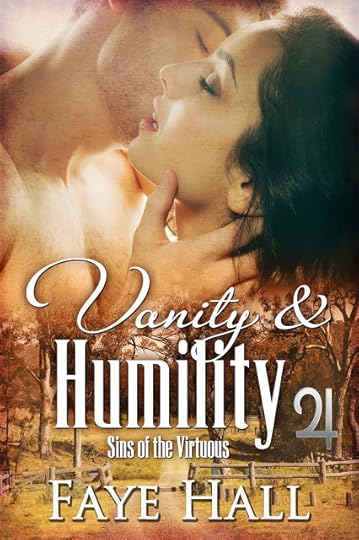
What if vanity threatened to destroy the only love you’ve ever known?
Detective Ethan Brant is on the hunt for a murderess who is seducing her victims and stealing collections of diamonds from each one. When the woman he suspects becomes his father’s newest wife, Ethan’s fears multiply. He’s determined to protect his only remaining family member, no matter the cost.
All of his attention is focused on bringing the guilty party to justice. He has no time for, or interest in, women. But when he discovers a beautiful, young woman swimming at the lake on his father’s property he feels an instant attraction.
Cady Eldon’s history with men taught her it was foolish to lose her heart to one. But when she meets Ethan, she can’t ignore the fire that burns inside her, making her long for the feel of his skin against hers. Discovering that he’s a police detective, she becomes intrigued. Why would a man whose family is wealthy want to live so humbly?
Her attraction to him, and her interest in the murder case he’s working on, pulls them together on a journey north where they become entangled in the manipulative web of the murderess Ethan is chasing. Ethan and Cady soon learn just how cruel one woman’s vanity can be and how she will stop at nothing to get the riches she believes she deserves.
Will their love survive, or will they fall victim to the greatest sin of all?
*Content Warning: contains sex, strong language, and some violence
Excerpt
She shrugged, looking as if her answer was obvious. “My uncle needed an extra set of hands on the farm, so I offered to help. I don’t think I was very good at it, but I managed to plant several drills by the end of a single day, and my uncle seemed happy with my efforts.”
“You actually worked on the farm?”
She giggled at his shock. “You needn’t sound so surprised. Anyone would think you’ve never seen a woman work before.”
“Other than applying layers of makeup to their faces, I haven’t. More to the point, the layers of clothing you all wear don’t allow for much of anything. Certainly not any form of physical labor.”
“That’s why I wore trousers.”
“You did what?”
She giggled again as she went to swim past him and toward the bank. He reached out, stopping her.
“I didn’t mean to offend you. I just found it so hard to believe what you were saying about your lifestyle up north. You are like no woman I’ve ever known.”
She waded in the water beside him. “There’s no offense taken, nor was your reaction the reason I was leaving. I just need to return to the garden before I’m missed.”
Still, he held her arm, gazing at her beauty. Focusing on the darkness of her eyes, he longed to drown in them, allowing himself to be consumed by this woman. Usually, he avoided any contact with the females he encountered, the mere thought of touching them repulsing him and reminding him of his last encounter with a woman. But here—now—he longed to pull this woman closer to him, to feel her skin against his.
“I don’t want you to go.” The words were being dragged from him, forcing him to make an admission he never thought to.
She pulled her arm free from his hold. “Yet I must.”
He watched her swim to the bank and step out of the water, her undershorts and chemise clinging to her. She was a shapely woman, her wet garments emphasizing her every curve, making him hunger for her in a way he never had for any woman before. Confusion filled him as he watched her pull on her simply styled, blue dress, quickly hiding her revealed self from his gaze. The few women he’d spent time with in the past had never created feelings in him as she was now. Usually he couldn’t wait to be separated from them, but watching as Cady finished dressing, preparing to leave him, a form of emptiness filled him. He had just met this woman. He wasn’t ready to be parted from her yet.
Swimming toward the bank where she stood, he stepped out of the water and quickly pulled on his trousers before walking up behind her. Only inches separated them, and he ached to reach out and touch her, but he didn’t want her to think that was all he craved from her.
“Do you really have to go?”
Turning to face him, she continued buttoning her gown. “You actually want me to stay, don’t you?”
He nodded.
“Why?” she asked.
He reached out to her, shifting a wet strand of hair back from her face. “Because you’ve stirred emotions in me I thought were long dead.” His hand dropped back to his side as he sighed deeply. “The brief past I had with women back in England taught me it was safer for me to keep my distance from them. I certainly never tolerated spending any length of time with them, listening to their gossiping. But you’re nothing like those women, and I find myself craving to share so much more than these past minutes with you. Listening as you’ve told me about yourself has been the most interesting evening I’ve ever spent with anyone.”
She raised an enquiring brow. “And I should believe your interest has nothing to do with you seeing me half-naked?”
“I found you fascinating long before you stepped out of the water and I saw you in your underclothing.” As he watched the slight blush fill her cheeks, her gaze averted from his, pleasure shot through him. “I’ve yearned to know more about you since the moment I met you.”
Her gaze slowly shifted back to his. “Then that’s a feeling we share, but I fear we shall have to leave our mutual discovery of each other to another time. Right now, I need to return to the gardens.”
Pick up your copy ofVanity and HumilityBeachwalk Press • Amazon • iBooks• Kobo • Barnes and Noble
Faye Hall
 Faye Hall spent her early years listening to stories about the families – including her own – who settled townships in and around her hometown in North Queensland, Australia. The local townspeople, including her own parents, told her stories of corruption and slavery, along with family secrets and forbidden love.
Faye Hall spent her early years listening to stories about the families – including her own – who settled townships in and around her hometown in North Queensland, Australia. The local townspeople, including her own parents, told her stories of corruption and slavery, along with family secrets and forbidden love.Desperate to remember what she’d been told, along with her already growing love of writing, Faye began to write about the history of her local area. Never could she have imagined the history of her small home town in Australia would become a growing list of published books.
Faye’s passionate stories combine controversial subjects and provocative encounters as her characters struggle to survive the lifestyle in early rural townships throughout Australia. She explores slavery and abortion, drug addiction and murder, as well as forbidden love and passionate affairs of the heart.
When she’s not writing, Faye enjoys sharing a bottle of wine with her husband in their ever-growing garden, and encouraging the varied interests of their combined family of nine children.
Connect with Faye: Website • Facebook • Twitter • BookBub • Tumblr • Pinterest • Instagram • YouTube.
Published on February 03, 2020 20:00
February 2, 2020
#BookReview — The Bridled Tongue by Catherine Meyrick #HistoricalRomance #HistoricalFiction @cameyrick1

The Bridled TongueBy Catherine Meyrick
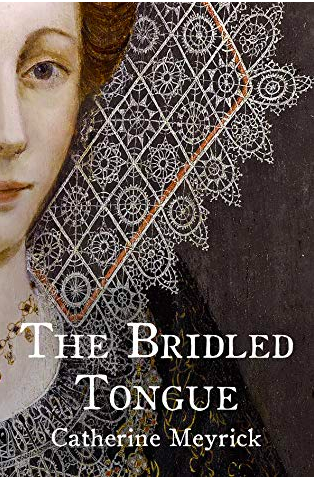
England 1586
Death and life are in the power of the tongue.
Alyce Bradley has few choices when her father decides it is time she marry as many refuse to see her as other than the girl she once was—unruly, outspoken and close to her grandmother, a woman suspected of witchcraft.
Thomas Granville, an ambitious privateer, inspires fierce loyalty in those close to him and hatred in those he has crossed. Beyond a large dowry, he is seeking a virtuous and dutiful wife. Neither he nor Alyce expect more from marriage than mutual courtesy and respect.
As the King of Spain launches his great armada and England braces for invasion, Alyce must confront closer dangers from both her own and Thomas’s past, threats that could not only destroy her hopes of love and happiness but her life. And Thomas is powerless to help.

“Do not look surprised. It is what every woman wants: husband, children, a household of her own.”
Alyce Bradley knew that her father was right, but at twenty-eight years old, Alyce knew her choice for a husband would be few and far between. But she is reassured in the knowledge that she will have the final say on who she chooses to spend the rest of her life with.
Thomas Granville is in search of a wife, one preferably with a large enough dowry to finance his latest venture. He will treat her with kindness and respect as long as she is, in turn, honourable and courteous. Alyce Bradley seems to be the bride that he has been searching for.
But Thomas Granville has a dark and dangerous history. It is one that will come back to haunt him and his new bride. Likewise, there are ghosts from Alyce’s past that will seek to destroy her.
From the beginnings of a great romance to a trial built on nothing more than malicious tongues and evil hearts, The Bridled Tongue by Catherine Meyrick is the hauntingly evocative romantic story of Thomas Granville and Alyce Bradley.
Catherine Meyrick has woven a tale that held me utterly captive from start to finish. The Bridled Tongue is a heart-wrenchingly compelling story of Alyce Bradley as she navigates the joy and wonder of falling in love with her husband — a love that she had never expected to feel — while trying to survive the slanderous and dangerous accusations that state that she is, in fact, a witch. Told with an impressive sweep and brilliance this story has it all — a dashing hero, a strong heroine and a rumour that threatens to destroy everything. What more can you ask for in a book?
With a powerful narrative that saw me reaching for the Kleenex on more than one occasion and a plot that was tense, powerful and utterly mesmerising, The Bridled Tongue has a lot to recommend it. Reading this novel was like stepping back in time. The small and intimate community that Meyrick has created is rife with gossip and rumours. It is a place where women would rather tear someone down and obliterate their good character than build them up. This story was depicted with incredible skill and diligence. This book, besides being a wonderfully tender romance, is also a story of survival in the face of impossible odds and unthinkable cruelty.
I adored the characterisation of Alyce. Alyce comes from the most dysfunctional family, who facade is one of self-importance and success, but in truth, they are falling apart at the seams. Jealousy is rife, and Alyce with her strong personality and moral sense of what is right and what is wrong doesn’t fit in at all. Although we never meet Alyce’s grandmother, we get the sense that this is who Alyce takes after. Alyce is a very caring woman who wants to help her sister and her family, and when she marries, her husband’s sister and tenants. She is an exceptionally gentle soul which makes what happens to her so incredibly vile. Alyce really drives this story forward, and at times her tale is difficult to read, but it is also gratifying. Her struggles become her strengths, and unlike her sister, Alyce does not give way to bitterness and anger.
Thomas Granville is a somewhat dashing hero who has sailed with Sir Francis Drake and fought the Spanish. He is an ambitious privateer, but as is the way with successful men, there are those that resent and hate him because of his achievements and because of some terribly tragic misunderstanding. Thomas’ past threatens to destroy his future with Alyce, which made this story not just a romantic one, but a thoroughly entertaining one as well. I enjoyed reading about Thomas very much. He is the perfect hero for our brave heroine.
Isabel Sutton, Alyce’s sister, is a genuinely awful person. She is spiteful at the beginning of this novel but by the end of it, she is a bitter and cruel woman who choices to blame all of her tragic loss and unhappiness on Alyce. Isabel tears her family cruelly apart, and I don’t think she even understands why. She is quick to anger and even quicker to point a finger. Isabelle is ruled by her emotions, and also, unfortunately, by her mother-in-law and her father-in-law. Isabel’s own desperately unhappy domestic situation only makes things worse. Jealously really drives Isabel’s character, and although at times she did rouse my pity, her subsequent reaction to these tragic events quelled much of the sympathy I had for her. I thought Meyrick’s depiction of Isabel was incredibly successful and more importantly, believable.
A cruel and vicious witch hunt is a topic that is seldom found in historical romance, but Meyrick has approached this story with a keen eye on the history and another on the human condition. The historical authenticity of this book has to be applauded. Meyrick has really outdone herself. She has captured the very essence of Elizabethan England. In the background of this story is the execution of Mary, Queen of Scots, and the growing threat from the Spanish, but in the forefront of this story, the fortunes and misfortunes of a mercer’s family are where the magic in the writing happens. Meyrick has a visceral understanding of what makes history worth reading, and she has recreated this world into an immensely readable tale. It is rife with intrigue and superstition, as well as being a remarkable love story.
If you are looking for your next great romance, or in fact, historical fiction read for this book crosses that divide, then look no further than The Bridled Tongue by Catherine Meyrick.
I Highly Recommend.
Review by Mary Anne Yarde.The Coffee Pot Book Club.
Pick up your copy ofThe Bridled TongueAmazon UK • Amazon US
Catherine Meyrick
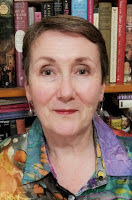 Catherine Meyrick is a writer of historical fiction with a particular love of Elizabethan England. Her stories weave fictional characters into the gaps within the historical record – tales of ordinary people who are very much men and women of their time, yet in so many ways are like us today.
Catherine Meyrick is a writer of historical fiction with a particular love of Elizabethan England. Her stories weave fictional characters into the gaps within the historical record – tales of ordinary people who are very much men and women of their time, yet in so many ways are like us today.She grew up in regional Victoria, Australia in a family with a love both of storytelling and of history in all its forms. After moving to Melbourne in her late teens, Catherine has worked as a nurse and a tax assessor, among other things, before finally finding her niche as a librarian. She has a Master of Arts in history and is also a family history obsessive.
Connect with Catherine: Website • Facebook • Twitter
Published on February 02, 2020 20:00
January 30, 2020
#BookReview — From His Perspective by Lisa Keeble #Fantasy #Satire #Humour
Published on January 30, 2020 20:00
January 29, 2020
Join me in Conversation with #Historical Romance author, Sara Bennett #interview #amwriting @SaraBennett16

Join me in Conversation with
Historical Romance author,Sara Bennett
MA: Please give a warm Coffee Pot welcome to Historical Romance author, Sara Bennett. Hi, Sarah. Welcome to the blog.
 SB: Thank you for inviting me to Coffee Pot Book Club. I am an Australian who lives in the state of Victoria, and I write under a number of pennames in a number of genres. It can get a bit confusing! Today I’m here wearing my historical romance writer Sara Bennett hat.I started writing for the US publisher Avon in 2002 and by the time that career ended in 2014 I had written 15 books for them. They ranged from Medieval, Scottish, to the Victorian era.Since then I’ve continued to write for traditional publishers and also to self publish. Last year I wrote four novellas in a Regency series called Mockingbird Square.
SB: Thank you for inviting me to Coffee Pot Book Club. I am an Australian who lives in the state of Victoria, and I write under a number of pennames in a number of genres. It can get a bit confusing! Today I’m here wearing my historical romance writer Sara Bennett hat.I started writing for the US publisher Avon in 2002 and by the time that career ended in 2014 I had written 15 books for them. They ranged from Medieval, Scottish, to the Victorian era.Since then I’ve continued to write for traditional publishers and also to self publish. Last year I wrote four novellas in a Regency series called Mockingbird Square.
MA: Can you share with us the inspiration behind your fabulous Pendleton Manor trilogy?
SB: My most recent book is also a Regency romance, called Meant To Be. This is the first book in my Pendleton Manor trilogy. I still have a lot of Sara Bennett fans, and it seemed like a good idea to give them something new. Maybe something a little different too, because I need to entertain myself when I write.

MA: It sounds like a wonderful series, and I LOVE your covers! What kind of challenges did you face writing a series set in the Regency era?
SB: The challenges of writing in the Regency era are more about the fact that it is such a popular area of romance rather than researching the people and the period. Because of that popularity my challenge was to make my stories different.
MA: There are many fabulous Regency Romances out there. Can you share with us three things that set your books apart?
SB: Harry Baillieu, the hero in my book, doesn’t always behave in a way that traditional Regency fans would consider heroic. Although he loves Sophy with all his heart, he is a product of his upbringing—a domineering and sometimes brutal father—and his position in society. It takes him a while to become the hero he wants to be.
My books tend toward darker themes, so don’t expect light hearted fun. Sophy’s father goes to prison when Harry’s father tries to separate his son from the girl he loves. Sophy discovers Harry is engaged to another woman. Harry has to give up everything to win her back.
Reviewers have called Meant To Be an emotional rollercoaster and I think that’s true. If you want a story that really tugs at the heartstrings then this book is for you.
MA: Last questions… Can you share with us what you are currently working on?
SB: I am hoping to have Against All Reason, the second book in the Pendleton Manor trilogy, ready to publish in 2020. This is Harry’s brother Adam’s story, the black sheep of the Baillieu family.
MA: Thank you so much for stopping by and chatting with us. If you would like to find out more about Sara, you can find her: Website• Facebook • Twitter.
Scroll down to find out more about Sarah’s fabulous trilogy.
Meant To BeBy Sara Bennett

Sophy and Harry were meant to be … until fate stepped in. Harry Baillieu is the heir to Pendleton Manor and his father has plans for him to wed a wealthy and titled woman. That’s not Sophy Harcourt, but Harry doesn’t care. He has known and loved her most of his life and intends to marry her. When things go wrong, and Sophy and her family are forced to leave Pendleton, Harry believes she has betrayed him. Determined to move on, he chooses a new wife. He tells himself that Lady Evelyn Rowe is perfect in every way, and they announce their engagement at a grand ball in Mayfair.But on that very night, Sophy returns. Sophy has been in love with Harry all her life. She knows they are going to marry and live happily ever after, because Harry tells her so. When scandal forces her to leave Pendleton, Sophy goes to live with her disreputable grandmother in London. She waits for Harry, thinking he will come after her, but he doesn’t. Three years later she learns that Harry is to be a guest at a ball in Mayfair, and she tells herself he only has to see her to fall in love with her all over again.But Harry is getting engaged to another woman.
Pick up your copy of
Meant To Be
Amazon UK • Amazon US
• iBooks
Published on January 29, 2020 20:00
January 28, 2020
Join author, Jacqueline Beard, as she explores the inspiration behind her fabulous books #amwriting #HistoricalFiction @jacquibwriter
An Author's InspirationBy Jacqueline Beard
My first foray into adult fiction came about through the murky pasts of my ancestor's. Other people have illustrious forebears. Mine are mad, bad and often dangerous to know. And there are plenty of them, given that my family tree has more than 55,000 individuals and climbing.
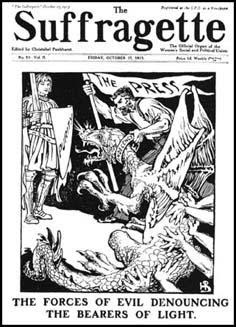 My first book,
Vote for Murder
, was inspired by the execution of Mary Emily Cage in 1851. Mary was hanged after poisoning her husband James with arsenic, and she may have killed several of her children. An admitted sinner and adulteress, Mary denied murdering her husband and went to her death without confessing. She was vilified by the press who reported every detail of her misconduct without any consideration for her circumstances. But Mary was a victim of domestic abuse. James had already been imprisoned for his ill-treatment of her while under the influence of alcohol. The family were destitute and in desperate need. In another century, there would have been far more sympathy for her situation.
My first book,
Vote for Murder
, was inspired by the execution of Mary Emily Cage in 1851. Mary was hanged after poisoning her husband James with arsenic, and she may have killed several of her children. An admitted sinner and adulteress, Mary denied murdering her husband and went to her death without confessing. She was vilified by the press who reported every detail of her misconduct without any consideration for her circumstances. But Mary was a victim of domestic abuse. James had already been imprisoned for his ill-treatment of her while under the influence of alcohol. The family were destitute and in desperate need. In another century, there would have been far more sympathy for her situation. Around the same time that I discovered my relationship (through marriage) to Mary Cage, I also found several suffragists in my family tree. They were peaceful activists, and their absence from the 1911 census suggests that they were at the census evasion night in The Old Museum, Ipswich organised by the prominent Suffolk suffragette Constance Andrews. I was fascinated by both stories, and they inspired my first adult fiction novel. Naturally, my protagonist in Vote for Murder is a suffragist, and her story weaves together with that of Mary's to produce a murder mystery set in Victorian and Edwardian Suffolk.

After finishing Vote for Murder , I gave myself a year off without thinking too hard about writing, but my family tree kept growing, and skeleton's continued to appear. I had long been fascinated by the genealogy of my East Anglian Corben family including the name variants Corbin and Corbyn. Having made a tenuous link back to Corbyn's in the late 1400s, I found a more recent connection (again by marriage) to Mary Corbyn of Fressingfield. Mary was rumoured to be a witch. Now, an accusation of witchcraft was not unusual in the 1600s, but a rarity in the 1890s. The basis of the allegation was the death of Mary's grandchild, which was reported in the press as follows:
Alleged Witchcraft in Suffolk. At an inquest held at Fressingfield on Thursday by Mr C W Chaston on the body of a child named Hammond aged 11, weeks, daughter of a labourer, the father and mother stated that they believed the death of the Child was due to the witchcraft of Mrs Corbyn, the Child's step-grandmother. This woman died a few hours before the Child and stated that the Child would not live long after her. The Child was taken out, and the father stated that he saw smoke issue from its perambulator and that the Child died upon being taken home, the mother stating that it was hot and dry, and smelt of brimstone. The medical evidence went to show that death was due to shock caused by the external application of some irritant, and the jury, in returning a verdict in accordance with the medical evidence said there was not sufficient evidence to show the nature of the irritant. George Corbyn said he was of the opinion that his late wife had the powers of a witch, and he always tried to do what she wanted in consequence.

I couldn't resist using this story as the starting point for the first of my Lawrence Harpham mystery novels, The Fressingfield Witch . A crime had occurred, but without evidence, there was no one to bring to justice. My book would have been very short, but for one thing. Fressingfield already had a witch.
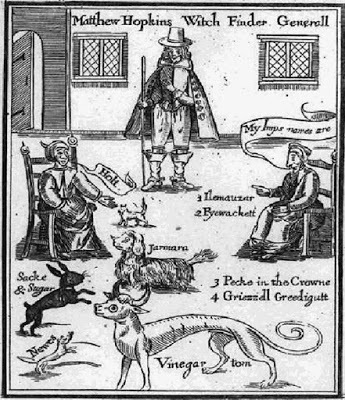 Faith Mills was a victim of witchcraft accusations from the Suffolk Witch Trials of the 1640s. She was one of the unfortunate women executed on the strength of allegations made by Matthew Hopkins and his Suffolk born colleague, John Stearne. The two men arrived in Fressingfield during the Witch Hunts and stoked up fear of the supernatural in the hope of personal gain. This genuine terror of witchcraft escalated in an atmosphere influenced by religion, politics and the civil war. The victims were mostly, though not always, women and they were exploited by Hopkins and Stearne who deliberately targeted the poor, vulnerable, marginalised or different.Once again, my book combined stories set in two different eras, this time involving Private Investigator Lawrence Harpham and his business partner Violet Smith.
Faith Mills was a victim of witchcraft accusations from the Suffolk Witch Trials of the 1640s. She was one of the unfortunate women executed on the strength of allegations made by Matthew Hopkins and his Suffolk born colleague, John Stearne. The two men arrived in Fressingfield during the Witch Hunts and stoked up fear of the supernatural in the hope of personal gain. This genuine terror of witchcraft escalated in an atmosphere influenced by religion, politics and the civil war. The victims were mostly, though not always, women and they were exploited by Hopkins and Stearne who deliberately targeted the poor, vulnerable, marginalised or different.Once again, my book combined stories set in two different eras, this time involving Private Investigator Lawrence Harpham and his business partner Violet Smith.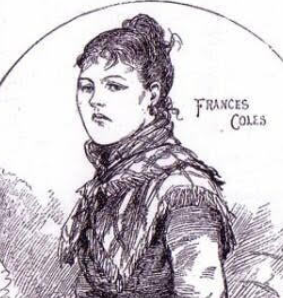 By the time I began writing the sequel, I was running out of interesting relatives and had started using historical newspapers as the basis for my stories. There is nothing quite as strange as real life, and I have found crimes covered in newspaper articles to be excellent sources of inspiration.
The Ripper Deception
, Book two in my series, was created from three separate newspaper stories. One featured a miser's death; one involved a haunted rectory and the final report described the inquest of Frances Coles who may or may not have been a victim of Jack the Ripper. Together, these three true stories created an unusual twist on a common theme.
By the time I began writing the sequel, I was running out of interesting relatives and had started using historical newspapers as the basis for my stories. There is nothing quite as strange as real life, and I have found crimes covered in newspaper articles to be excellent sources of inspiration.
The Ripper Deception
, Book two in my series, was created from three separate newspaper stories. One featured a miser's death; one involved a haunted rectory and the final report described the inquest of Frances Coles who may or may not have been a victim of Jack the Ripper. Together, these three true stories created an unusual twist on a common theme. I have recently published a Christmas short story, The Montpellier Mystery , and the next full-length book in the Lawrence Harpham series, The Scole Confession, is due out early next year. Both books rely heavily on newspaper coverage of actual events. Both are set in recognisable English towns and those readers so inclined, can identify the real people who were involved in the accounts. If they look closely, they may even find them in their family trees!

Jacqueline Beard
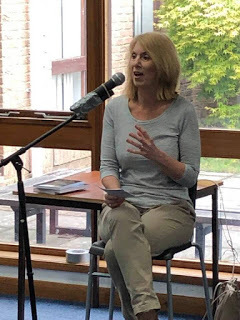 Jacqueline Beard is a writer and genealogist living in Gloucestershire with an East Anglian ancestry going back to the 1500s. She writes Victorian murder mysteries and is currently working on the third book in the Lawrence Harpham series. Jacqueline's books are a mixture of true crime and fiction inspired by local newspaper reports. When Jacqueline is not writing or researching "dead people" as her husband so charmingly puts it, she is usually walking in the glorious Cotswolds with her Cockapoo, Teddy. Jacqueline loves technology and spends far too much time on her computer. She dislikes flying, dentists and balloons - especially red ones.
Jacqueline Beard is a writer and genealogist living in Gloucestershire with an East Anglian ancestry going back to the 1500s. She writes Victorian murder mysteries and is currently working on the third book in the Lawrence Harpham series. Jacqueline's books are a mixture of true crime and fiction inspired by local newspaper reports. When Jacqueline is not writing or researching "dead people" as her husband so charmingly puts it, she is usually walking in the glorious Cotswolds with her Cockapoo, Teddy. Jacqueline loves technology and spends far too much time on her computer. She dislikes flying, dentists and balloons - especially red ones.Connect with Jacqueline: Website • Facebook • Twitter • Instagram.
Published on January 28, 2020 20:00
January 27, 2020
Join #HistoricalFiction author, Mercedes Rochelle as she takes a look at life in the time of Richard II and Edward II @authorrochelle
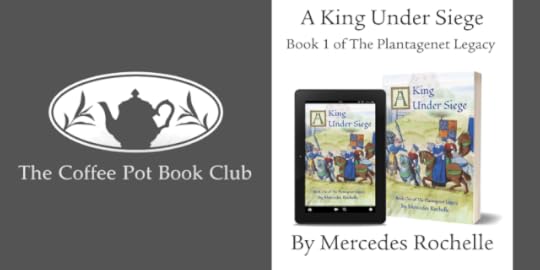
Life in the time ofRichard II and Edward II by Mercedes Rochelle
 Capture of Edward II, from Froissart Chronicles, BN MS Fr. 2675 Source, Wikipedia.
Capture of Edward II, from Froissart Chronicles, BN MS Fr. 2675 Source, Wikipedia. It doesn't take a huge leap of imagination to connect the two English usurpations of the fourteenth century—both Plantagenets, both accused of letting their favorites unduly influence them, both probably murdered while in prison. (And both of whose murders are debated to this day.) We can be sure the association was very much on Richard II's mind, especially during the latter half of his reign. But Edward's fate was most forcibly shoved in his face during the standoff between him and the "Wonderful" Parliament in 1386. This was when the Commons decided to impeach the chancellor, Michael de la Pole—the first official in English history to be removed by impeachment.Richard was highly indignant that the Commons dare pass judgment on his great officers. He was quoted as saying, “I will not dismiss so much as a scullion from my kitchen at your request!” And he meant it. Taking his friends and household to Eltham, he removed himself from Parliament, making it impossible for them to get any business done without his presence. But this state of affairs could not last long, and the Lords and Commons sent the Duke of Gloucester and Thomas Arundel, Bishop of Ely to persuade the king to return. Richard hated Gloucester, his youngest uncle, who was overbearing, arrogant, and brutal with his criticism. This day proved no exception. Unbeknownst to Richard, before he left Parliament, Gloucester had sent for the archives to see if he could find a precedent from Edward II’s deposition which he might use against his nephew. He found none, but proceeded to fabricate one anyway, to frighten Richard into cooperating. He told Richard, “If ever the king, through evil counsel or wanton ill will, alienates himself from the people—if he does not wish to be ruled by the laws of the land, then it is lawful for them by common consent to remove that king from the royal throne, and substitute another close relative of the royal line in his place." It worked. Shocked and intimidated, Richard meekly returned to London and permitted Parliament to impeach Michael.


Richard II found himself under siege not once, but twice in his minority. Crowned king at age ten, he was only fourteen when the Peasants' Revolt terrorized London. But he proved himself every bit the Plantagenet successor, facing Wat Tyler and the rebels when all seemed lost. Alas, his triumph was short-lived, and for the next ten years he struggled to assert himself against his uncles and increasingly hostile nobles. Just like in the days of his great-grandfather Edward II, vengeful magnates strove to separate him from his friends and advisors, and even threatened to depose him if he refused to do their bidding. The Lords Appellant, as they came to be known, purged the royal household with the help of the Merciless Parliament. They murdered his closest allies, leaving the King alone and defenseless; he would never forget his humiliation at the hands of his subjects. Richard's inability to protect his adherents would haunt him for the rest of his life, and he vowed that next time, retribution would be his.
Excerpt
(when Gloucester is told about Richard’s questions to the Judges)
"They declared that anyone guilty of these trespasses against the king's royalty should be punished as traitors.""What!" Gloucester sprung to his feet, throwing his goblet into the fireplace. "That little bastard has gone too far!" He started pacing while the other quietly sat, watching him. "Damn, his father would have knocked some sense into him if he had been alive. What have we come to when a spoiled, ungovernable child can wield such power?""I would dare remind you that Richard is twenty years old.""And acts like a fool!" He paced some more before sitting back down. "All right, let us consider exactly what happened. Where did this take place?""The first conference was at Shrewsbury. Then a week later, he repeated the questions at Nottingham.""Hmm. Why did he do it twice?""I believe the king wanted to demonstrate that the judges were not acting under duress.""They were the same judges both times?""All but one." "And they used the word 'traitor'?""Ah, the distinction was purposeful. They said the guilty should be punished as traitors, not that they weretraitors," said Wickford, priding himself on his legal knowledge."Small comfort.""It is a fine difference, but a difference, nonetheless. By speaking so, they skirted the precise definition of the Treason Act of 1351... "Which defined traitors as those who attacked the king directly, aided the king's enemies or levied war against the king in his realm. Since our recent acts of Parliament were directed against the king's friends—""They were therefore not treasonous, as per the Statute.""However, my nephew seeks to redefine treason—""Which brings us back to the terrible days of Edward II—""God forbid!" Thomas stood again and started his pacing. King Edward's rein was infamous; he encouraged his favorites—the Despenser father and son—to run rampant throughout England. They illegally seized lands, tortured and imprisoned their enemies, and murdered their victims—among other atrocities. The potential parallels between Edward II's favorites and Richard's favorites rose before him like a specter.Wickford sighed. "There is one more thing..."Gloucester stopped, his back to the archbishop."One of the questions referred to 'the person who sent for the Statute concerning the deposition of Edward II'."The wind pounded the windows as Gloucester gasped, appalled. He turned, staring at Wickford as if seeing him for the first time. Both men knew this was a direct attack on Thomas. "Is this person to be punished as a traitor, then?"The archbishop nodded, reluctantly."Then there is no turning back is there? We must retaliate before it is too late."
The Coffee Pot Book Club
★★★★★
Highly Recommended
Read the full review HERE!
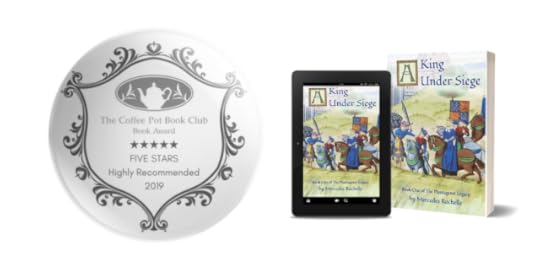
Pick up your copy ofA King Under SiegeAmazon UK • Amazon US
Now available onAudio
Mercedes Rochelle
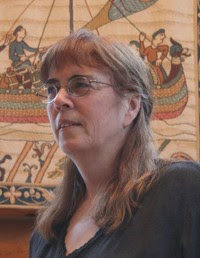 Born in St. Louis MO with a degree from University of Missouri, Mercedes Rochelle learned about living history as a re-enactor and has been enamored with historical fiction ever since. A move to New York to do research and two careers ensued, but writing fiction remains her primary vocation. She lives in Sergeantsville, NJ with her husband in a log home they had built themselves.
Born in St. Louis MO with a degree from University of Missouri, Mercedes Rochelle learned about living history as a re-enactor and has been enamored with historical fiction ever since. A move to New York to do research and two careers ensued, but writing fiction remains her primary vocation. She lives in Sergeantsville, NJ with her husband in a log home they had built themselves.Connect with Mercedes: Website • Blog • Facebook • Twitter
<!-- /* Font Definitions */ @font-face {font-family:"Cambria Math"; panose-1:2 4 5 3 5 4 6 3 2 4; mso-font-charset:0; mso-generic-font-family:roman; mso-font-pitch:variable; mso-font-signature:-536870145 1107305727 0 0 415 0;} @font-face {font-family:Calibri; panose-1:2 15 5 2 2 2 4 3 2 4; mso-font-charset:0; mso-generic-font-family:swiss; mso-font-pitch:variable; mso-font-signature:-536858881 -1073732485 9 0 511 0;} @font-face {font-family:"Segoe UI Symbol"; panose-1:2 11 5 2 4 2 4 2 2 3; mso-font-charset:0; mso-generic-font-family:swiss; mso-font-pitch:variable; mso-font-signature:-2147483165 302055407 262144 0 1 0;} @font-face {font-family:Code; panose-1:2 11 6 4 2 2 2 2 2 4; mso-font-alt:Code; mso-font-charset:0; mso-generic-font-family:swiss; mso-font-pitch:auto; mso-font-signature:3 0 0 0 1 0;} /* Style Definitions */ p.MsoNormal, li.MsoNormal, div.MsoNormal {mso-style-unhide:no; mso-style-qformat:yes; mso-style-parent:""; margin:0cm; margin-bottom:.0001pt; mso-pagination:widow-orphan; font-size:12.0pt; font-family:"Times New Roman",serif; mso-fareast-font-family:"Times New Roman";} a:link, span.MsoHyperlink {mso-style-priority:99; color:#0563C1; mso-themecolor:hyperlink; text-decoration:underline; text-underline:single;} a:visited, span.MsoHyperlinkFollowed {mso-style-noshow:yes; mso-style-priority:99; color:#954F72; mso-themecolor:followedhyperlink; text-decoration:underline; text-underline:single;} p.Default, li.Default, div.Default {mso-style-name:Default; mso-style-unhide:no; mso-style-parent:""; margin:0cm; margin-bottom:.0001pt; mso-pagination:widow-orphan; mso-layout-grid-align:none; text-autospace:none; font-size:12.0pt; font-family:"Code",sans-serif; mso-fareast-font-family:Calibri; mso-fareast-theme-font:minor-latin; mso-bidi-font-family:Code; color:black; mso-ansi-language:EN-US; mso-fareast-language:EN-US;} .MsoChpDefault {mso-style-type:export-only; mso-default-props:yes; font-size:11.0pt; mso-ansi-font-size:11.0pt; mso-bidi-font-size:11.0pt; font-family:"Calibri",sans-serif; mso-ascii-font-family:Calibri; mso-ascii-theme-font:minor-latin; mso-fareast-font-family:Calibri; mso-fareast-theme-font:minor-latin; mso-hansi-font-family:Calibri; mso-hansi-theme-font:minor-latin; mso-bidi-font-family:"Times New Roman"; mso-bidi-theme-font:minor-bidi; mso-ansi-language:EN-US; mso-fareast-language:EN-US;} .MsoPapDefault {mso-style-type:export-only; margin-bottom:8.0pt; line-height:107%;} @page WordSection1 {size:612.0pt 792.0pt; margin:72.0pt 72.0pt 72.0pt 72.0pt; mso-header-margin:36.0pt; mso-footer-margin:36.0pt; mso-paper-source:0;} div.WordSection1 {page:WordSection1;} </style></div><br /><br /><br />
Published on January 27, 2020 20:00
The Coffee Pot Book Club
The Coffee Pot Book Club (formally Myths, Legends, Books, and Coffee Pots) was founded in 2015. Our goal was to create a platform that would help Historical Fiction, Historical Romance and Historical
The Coffee Pot Book Club (formally Myths, Legends, Books, and Coffee Pots) was founded in 2015. Our goal was to create a platform that would help Historical Fiction, Historical Romance and Historical Fantasy authors promote their books and find that sometimes elusive audience. The Coffee Pot Book Club soon became the place for readers to meet new authors (both traditionally published and independently) and discover their fabulous books.
...more
...more
- Mary Anne Yarde's profile
- 159 followers



